- Home
- Scott Westerfeld
Mirror's Edge Page 3
Mirror's Edge Read online
Page 3
I flex my fingers. It feels like someone else’s hand.
The door slides open, and a woman with a blandly pretty face walks into the recovery room. But it’s not a person; it’s the avatar of the sovereign city of Diego.
That aloof expression makes me twitch—the Diego city AI once took me captive for a month, trying to determine if I’ll be fit to rule Shreve when they get rid of my father. I passed their tests, but I’ll never forget that they held me against my will.
“How do you feel?” the avatar asks.
I shrug, not wanting to show any weakness. “Nothing hurts.”
“Have you seen your new face?”
“Last week, with one of those mirrors that shows what you’ll look like. But I haven’t seen the results yet.”
Diego sits down, smiling gently. Impassive, but connected to a mind that’s the sum of every processor in this city of four million.
“Take your time,” they say. “Dysmorphia can be tricky.”
I give the avatar a frown. “You’re a machine, wearing a body like it’s a suit of clothes. You don’t know anything about it.”
“True, we have no practical experience with dysmorphia,” the avatar admits. “But your mental state is important to us, Frey.”
“As always,” I mutter. The free cities want the next ruler of Shreve to be stable, predictable. “Are you here to test me again?”
“No. Only to say hello.”
This makes me roll my eyes, which feels particularly weird.
Fresh out of the tank, my cheeks seemed to intrude on my vision. A doctor did a scan to make sure my eyeballs still fit inside their remade sockets. She said everything was fine, and that I’d get used to my new “visual field.”
But my world has a different shape now.
“You may find yourself obsessing over small flaws with your new body,” the avatar says. “That’s a sign of dysmorphia. If you start to feel ugly, ask for help.”
I frown at the word ugly.
Lots of people get surge. Rafi’s rich friends, the staff in the tower—all of them altered their faces every few months. But hardly anyone transforms completely anymore, like an old-time ugly on their sixteenth birthday.
“How is this so weird?” I ask. “Back in the pretty regime, everyone loved getting surgery.”
The avatar shrugs. “Uglies spent sixteen years preparing to change. They were told every day that no one would listen to them or love them until they were pretty. They were taught to hate their real selves, so losing who they were was easy.”
I swallow. Maybe that’s the problem. After impersonating my sister for so long, I barely have a real self to lose.
“You’ve never worried about your looks, have you, Frey?”
“My looks always belonged to Rafi, like our clothes, her friends.” Even my name is hers, jumbled and misspelled. My face has always been my sister’s, not mine to throw away.
And yet that’s exactly what I’ve done.
“Dysmorphia by proxy,” the avatar says with a smile. “Perhaps you can ask Boss X about that when you see him.”
“X isn’t confused about who he is,” I say.
His surge is truly radical, as close to a wolf as human can be. If anyone knows what it means to get a new body, it’s him.
I’ve never had the nerve to ask X why he chose to change himself that way. But I’ve always wondered if it had anything to do with my brother.
“Perhaps because he’s one of a kind now,” the avatar says. Then their face goes motionless for a moment, as if that vast mind, sprawled across a whole city, is choosing their words carefully. “Maybe this distance from your sister will be good for you,” they finally add.
And suddenly I’m convinced that they planned this whole conversation.
Every subject we’ve discussed—dysmorphia, my sister, Boss X—was guiding me to this point. Anger makes my heart shuddery in my chest.
“When we were planning this mission,” I say, “Col thought you wouldn’t let me go. That you’d try to keep me safe in Rafi’s mountain, ready to take over Shreve when my father’s gone.”
“But we did not object,” the avatar points out.
“Because for this mission work, I’d have to get camo-surge, which means looking different from my sister. You wanted this!”
“An interesting theory,” they say.
“Is it true?”
A soft sigh. “Our mind doesn’t work like yours, Frey. You tell yourself a simple story about your motivations, your desires. We model millions of possible outcomes, weighing each in terms of value to the world. Then we pursue the path with the most positive sum total.”
My annoyance is building. “I get it. Your brain’s bigger than mine.”
“Merely different. Our motives can’t be reduced to something simple, like wanting Rafia to reject your new face. Like wanting you to be free to embrace your own destiny.”
“And yet it sounds like you’ve thought about it.”
“We think about everything, Frey. Especially when it comes to you.”
I let out a groan. I haven’t even told Rafi about this surge yet, because she’ll be more angry than I want to imagine. And while I worry about my sister, the free cities are busy making their plans for me.
It’s like playing chess against a dozen demigods at once.
Maybe it’s time to stop playing.
“When are you going to kill my father?” I ask.
“No date has been set.”
“A brain that big, and you can’t make a decision?”
“Twelve cities are involved in this alliance, Frey. Each with its own agenda and decision-making processes.”
“So it’s never going to happen!” I shout.
“Frey,” the avatar says. “You were born to guide Shreve going forward, and you shall. Your father’s days are—”
Diego’s voice shuts off as a door slides open. Into the recovery room comes a tall, handsome boy in hospital whites.
I take a slow breath. The doctors told me to stay calm while my body settles. I roll up my sleeve so the boy can check my vitals.
But he just stares at me.
“Frey?” he asks.
There’s something about him.
Then I remember last week, when Col showed me which face …
But it’s not the same as on a screen.
Fresh confusion rushes through my new body. My cheeks press up to crowd my eyes. My legs feel tangled, my hands like loose gloves.
It’s him, but not. His eyes shatter me.
Col’s gaze is the mirror I’ve been afraid to look into.
The doctors didn’t change my heart, but it’s beating slantways in my chest. Askew, along with every muscle, every gesture, every centimeter of my skin.
I’m used to being an impostor—that’s what I’ve always been—but Col can’t be wrong.
He was the first person to see the real me, the me that exists separate from my sister.
What if he can’t see me anymore? What if I can’t see him?
“Frey,” he says again, more certainly. He takes my hand, and for a moment, I’m okay. He smiles a little. “Isn’t this weird?”
Of course—for Col Palafox a new body is something wild and exciting, a science experiment bubbling up from a beaker.
He’s always known who he is.
Col’s confidence steadies me, even if the questions are still racing through my head.
What if my new face is something more than camouflage? What if I’ve lost myself for good?
What if every disguise changes me, just like every lie?
I can’t let the Shreve AI see me in military-grade gear, so before my head breaches the surface, I take off my helmet. On that signal, my wings dissolve into the water around me.
I walk out of the lake in a modest Shreve bathing suit, trying not to think about the dust all around me, watching. It won’t be long before—
“Good swim, Islyn?” comes a voice in my comms.
I breathe deep, keeping my expression steady. I’ve heard the voice of the Shreve city interface before, but the sound of it still sends a shiver through me.
It’s too much like his voice.
My father likes to be in every citizen’s ear, all day, every day. Not an exact match, of course—when he gives an important speech you know it’s really him. The Shreve interface sounds more like his younger, more approachable brother.
But it’s close enough to cast my father’s shadow on every interaction with the city, a constant reminder that no one here can escape his will.
And unlike the mind of Paz, which only comes when called, the Shreve AI talks to you anytime it wants.
“Yes, sir,” I answer. “The water’s lovely tonight.”
“A forty-minute swim! That’s eighteen merits, Islyn.”
“Thank you, sir.”
I walk out of the water, my backpack over a shoulder, like I took it swimming. Suspicious, or at least weird, but the Shreve AI isn’t a person, like Paz or Diego. My father doesn’t want his own city vying against him for control, so he keeps it deliberately brain-missing.
Instead of a fully self-aware neural net, the Shreve AI is just a galaxy of algorithms, all asking the same question a million times a second:
Is this citizen obedient or rebellious?
Productive or a miscreant?
Good or bad?
We’re gambling on the AI’s simplemindedness, hoping it sees seven people swimming together at midnight as healthy exercise, not a mystery to be investigated.
Zura is already on the narrow beach that runs around the lake, playing catch with Lodge—the two Specials out of the water first. Their camo-surge has downplayed their inhuman muscles, but they still look like bodybuilders in their swimsuits.
They wave at me, all of us acting like midnight beach parties are perfectly normal. As if being back in Shreve in a surged body wasn’t weird enough.
Above the trees, the shed luster of the city makes the sky glow orange and pink.
The AI thought I’d been swimming for forty minutes, so we must have splashed down behind schedule. Our Shreve identities were supposed to have jumped into the lake just ten minutes before the landing—at least, that’s when the records of our counterfeit lives end, waiting for us to take over.
Still, it’s apparently close enough to fool the Shreve AI. And the longer swim means more merits for me—or for my alter ego, anyway.
Not that she needs them. Islyn likes hiking and camping, does volunteer cleanup on the park trails, and has never been arrested or shame-cammed. Like all our new identities, she has stacks of good behavior merits.
We’re model citizens, above suspicion. Last week, Col asked Zura if our fake selves weren’t a little too perfect, but she only laughed.
In Shreve, plenty of citizens are perfect. It pays to be.
Two figures are strolling down the dark strip of beach toward us. Riggs, already dry and dressed in her street clothes, and Boss Charles, who looks the most different of all of us. She chose a very pretty face, at the outer limit of what’s allowed in Shreve—not what I expected from a rebel boss.
But now she’s limping, a trickle of blood coming from her nose. Her forearms and elbows are scraped.
“You okay?” I ask.
Charles shrugs. “Bumped the bottom.”
Shreve’s voice comes again in our comms. “Do you need medical attention?”
“No, sir.” Boss Charles forces a hearty smile. “Great swim!”
The last thing we want is a med drone showing up. One millimeter-wave scan of the Specials and we’re done.
Boss Charles was lucky. At forty meters a second, hitting the bottom could’ve been …
I look both ways down the beach. “Anybody seen the others?”
Zura shakes her head.
Out on the dark surface of the lake, the floating fallen leaves are oddly still, untroubled by the breeze.
Crash gel is great for landing in, but deadly for swimmers—you can’t breathe it, but it’s not dense enough to float in. Zura regaled us with tales of Rusty-era sailors in flotation vests drowning in storms, their lungs full of sea foam.
The nanos have turned the whole lake into a death trap.
If Col’s or Yandre’s helmets broke on impact, they might be suffocating down there.
But I can’t call out for them—any sign of distress will alert the city.
I switch my vision to infrared, but there’s no heat glimmering on the surface of the lake. The gel is too good an insulator.
We can only wait.
“Let’s play a different game,” Zura says.
It’s awful, but she’s right. We can’t stand here staring at the lake—the city pays attention to what people are looking at, to what their faces show.
We can’t risk an emergency response team showing up.
Lodge and Zura start playing soccer. The rest of us pretend to be relaxing on the beach.
I try not to do the math, but my own oxygen supply had less than twenty minutes left when I landed. If Col and Yandre are still down there, what are they breathing?
If they never reappear, we have to keep going without looking for them. Without a word about our loss. Without shedding a tear.
Nothing that the dust might spot.
The spy has programmed our fake identities to self-erase the moment the Shreve AI wonders where we are, whether at the mission’s end or anywhere along the way … Col and Yandre will simply cease to exist.
This is why Zura kept saying terrifying things about the jump—to prepare us in case the worst happened.
I watch Zura, searching for any emotion in her eyes. She’s known Col since he was a child, Yandre too. But her new face, surged to the boring look of a Shreve citizen, remains expressionless.
I turn back to the lake, a cold fist closing around my heart.
The worst part is, I can save them.
In Shreve, all you have to do is say the word emergency three times, and the dust will hear. Med drones and rescue craft would get here in minutes. But when they dive into the lake, they won’t miss that it’s full of crash gel. Security would be on the scene before the rescue was complete.
We’d all be in my father’s hands—not just Col and Yandre.
My father has hated me with a world-wrecking passion since I killed his son. Sometimes I think his invasion of Victoria was just an excuse to fire a missile at me.
What would he do if he caught me now?
I stare at the lake again, not caring if I look suspicious. This awful silence can’t be true.
It would be so easy to say the words:
Emergency, emergency, emergency.
If we’re captured, our friends can rescue us. The free cities will be here soon enough in force.
Is any of this worth losing Col?
I open my mouth, ready to betray us all …
That’s when I see it—a thin stick jutting from the surface.
It’s moving back and forth, like a signal flag.
I open my backpack as calmly as I can and pull out my survival kit.
“Going for a swim,” I say briskly, and hurl myself into the lake.
Col gazes at me, and I try to look at him too.
I saw this new face last week, on an airscreen back in Rafi’s lair. But here in the flesh, it’s too much. Too real.
His eyes are blue instead of brown, his skin lighter than a Victorian’s. The surgery didn’t change his nose, but his new cheeks are like mine—classic pretty, high and sharp. He’s still handsome, but in a generic way.
Every few breaths, I have to shut my eyes to reset myself. To keep from feeling like a piece is missing from my heart.
I’ve only ever kissed one face, and now it’s gone.
When I open my eyes again, this new Col is still gazing at me, like an oddly intense stranger on a public train.
“Are you okay?” he asks. “Did you look at yourself too soon?”
“I haven
’t yet, but your new face is giving me … dysmorphia by proxy.”
Col’s wrong-colored eyes widen. “Points for terminology.”
“Diego’s words, not mine.” I’m thankful that the avatar has left us alone. It was messing with my head the whole time. “Sorry. This is hitting harder than I thought.”
“Tell me about it,” Col gently encourages.
I open my mouth to explain, and even that simple motion makes the muscles of my face feel funny.
“Doesn’t it feel wrong to you?”
He shrugs. “I always wanted to get surge. But my mother wouldn’t let me. It wasn’t the Palafox thing to do.”
Of course. Aribella Palafox, indomitable ruler of Victoria, wouldn’t want the first son getting frivolous surge.
But I can’t imagine Col wanting to change himself. “You didn’t like your face?”
“I didn’t want anything permanent. But all my friends got to look however they wanted!”
“Rafi’s friends too. But Father never let her.” I point at my eyebrow. “Except when we got this …”
But the scar we shared, from the assassination attempt, is gone from my face.
I have to take a few deep breaths.
Col gently touches the place where it’s missing. “I used to go out into Victoria without my minders, pretending to be normal. Not someone from a famous family, with everyone always watching me. Now I get to see what that’s really like.”
I look at him, trying to smile. “You do look pretty average.”
“You don’t want to know what it would be like? To be two random people?”
“Who live in a random dictatorship?” I say. “At war with all its neighbors?”
“But it won’t be our war anymore. We’re two kids who don’t care about all that. Islyn and Arav, model citizens in love.”
I have to laugh. “This is a side of you I haven’t seen before.”
“See? The surge is already working.”
I turn away from Col’s—or Arav’s—enthusiasm. “Okay, I get it. People want to escape who they are, now and then. But being someone else was my job for sixteen years.”
“Islyn is someone who never had that job,” he says.
I close my eyes, trying to imagine what that would feel like.

 Uglies
Uglies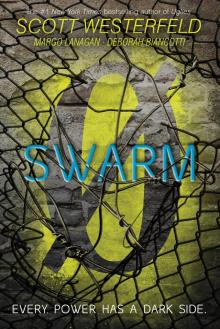 Swarm
Swarm Pretties
Pretties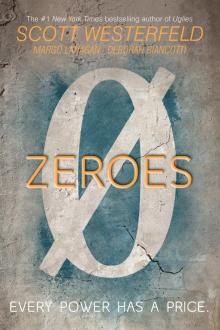 Zeroes
Zeroes The Secret Hour
The Secret Hour Behemoth
Behemoth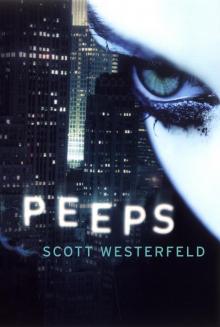 Peeps
Peeps Specials
Specials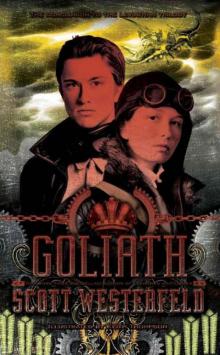 Goliath
Goliath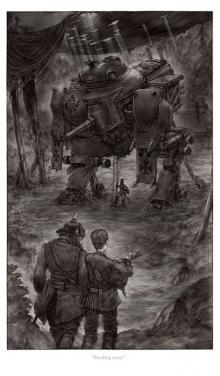 Leviathan
Leviathan Extras
Extras Shatter City
Shatter City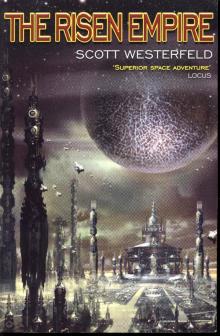 The Risen Empire
The Risen Empire Touching Darkness
Touching Darkness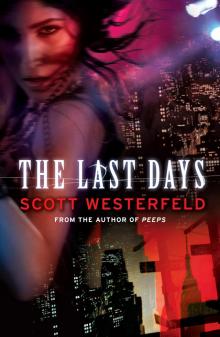 The Last Days
The Last Days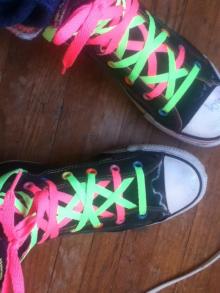 So Yesterday
So Yesterday The Killing of Worlds
The Killing of Worlds Afterworlds
Afterworlds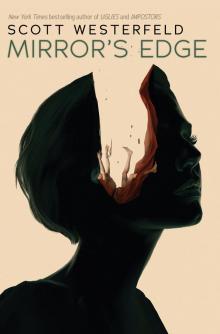 Mirror's Edge
Mirror's Edge Evolution's Darling
Evolution's Darling Blue Noon m-3
Blue Noon m-3 Touching Darkness m-2
Touching Darkness m-2 Impostors
Impostors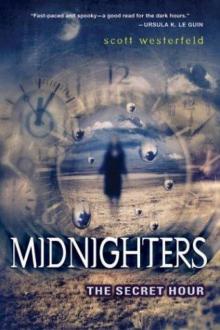 The Secret Hour m-1
The Secret Hour m-1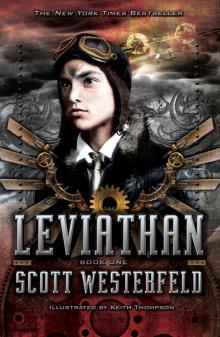 Leviathan 01 - Leviathan
Leviathan 01 - Leviathan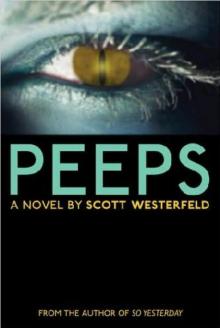 Peeps p-1
Peeps p-1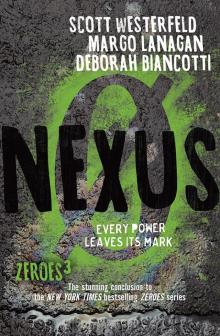 Nexus
Nexus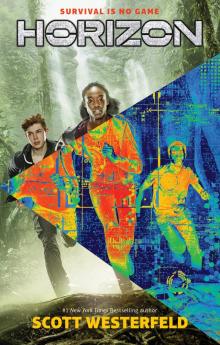 Horizon
Horizon Bogus to Bubbly
Bogus to Bubbly Goliath l-3
Goliath l-3 The Last Days p-2
The Last Days p-2 Behemoth l-2
Behemoth l-2 Stupid Perfect World
Stupid Perfect World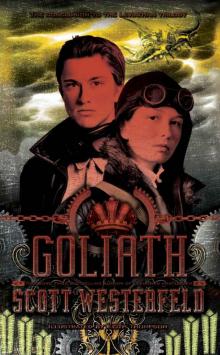 Goliath (Leviathan Trilogy)
Goliath (Leviathan Trilogy)